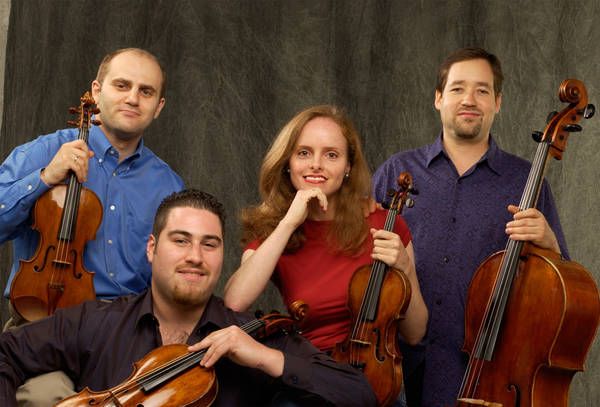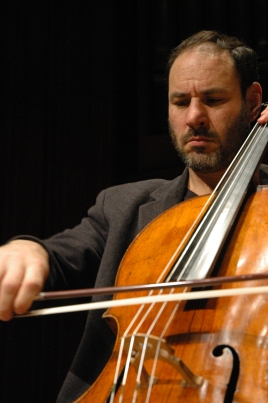Amernet Quartet, cellist Hoffman shine in music of past and present
One of the world’s greatest chamber works shared the stage with one of the newest in a highly charged performance that ended the season for Sunday Afternoons of Music.
The Amernet String Quartet, in residence at Florida International University, was joined by the well-known cellist Gary Hoffman in Schubert’s Quintet in C Major and a new work by Hoffman’s brother, the Cincinnati-based composer Joel Hoffman. It was a fine idea—and unusual for these concerts—-to combine the old and beloved with the new, particularly with an ensemble with the finesse, richness of tone and musical panache of the five musicians on stage Sunday at Gusman Concert Hall.
Joel Hoffman, professor of composition and artistic director of the new music festival at the University of Cincinnati, composed Three for Five for string quartet and cello on a commission from Sunday Afternoons of Music. As he explained in a brief introductory talk, he intended the extra cellist (in this case his younger brother) to play a featured role. The work he produced turned out to be brilliantly crafted to put the second cello at center stage, surrounded by sounds of great rhythmic and harmonic complexity, with textures so transparent that the cello was never overpowered.
It opens with repeated figures in the quartet and the cello breaking through the pattern, leading to an increasingly complex and agitated embroidery of sound. The second section is a long aria for the cello over the flute-like tones of the quartet, a singing but bracingly contemporary melody that takes the cello to the very top of its range. The concluding section opens with a rhythmic, hard-driving tone that softens into warm repose before the opening patterns return.
The concert opened with the quartet alone for what was to have been a performance of Mozart’s Quartet in B-flat Major, K. 589. But, as violist Michael Klotz explained, they thought a different work would vary the program more effectively, and so they performed La Oración del Torero, or The Bullfighter’s Prayer, by the 20th-century Spanish composer Joaquin Turina.
An atmospheric work loaded with Spanish color and rhythms, this one-movement piece is a sort of tone-poem for string quartet. Handled with verve by the Amernet ensemble, it was a well-chosen appetizer for a program that was otherwise pretty heavy listening, with the coming demands of a new work and the sprawling Schubert Quintet.
One couldn’t ask for a more mellow account of Schubert famous first-movement melody, warmly phrased yet restrained, without veering into schmaltz. In the second movement, first violinist Misha Vitenson brought a striking variety of colors and intensity to the wisps of melody Schubert uses over the long-held chords of the other instruments. The agitated middle section lacked some of the bite it seems to need to cut through the surrounding serenity, although the musicians played with polish and vigor.
Of particular note was Michael Klotz’s viola work, an instrument Schubert was said to have played on chamber music evenings with friends. The quintet has lots of interior figures—often quite fast—for the viola, and he brought them off with rock-solid tone and technique. The last movement sounded a little scrappy in the violins, possibly because it was at the end of the last piece on a long and difficult program.
Posted in Performances
Leave a Comment
Mon May 24, 2010
at 10:02 am
No Comments

